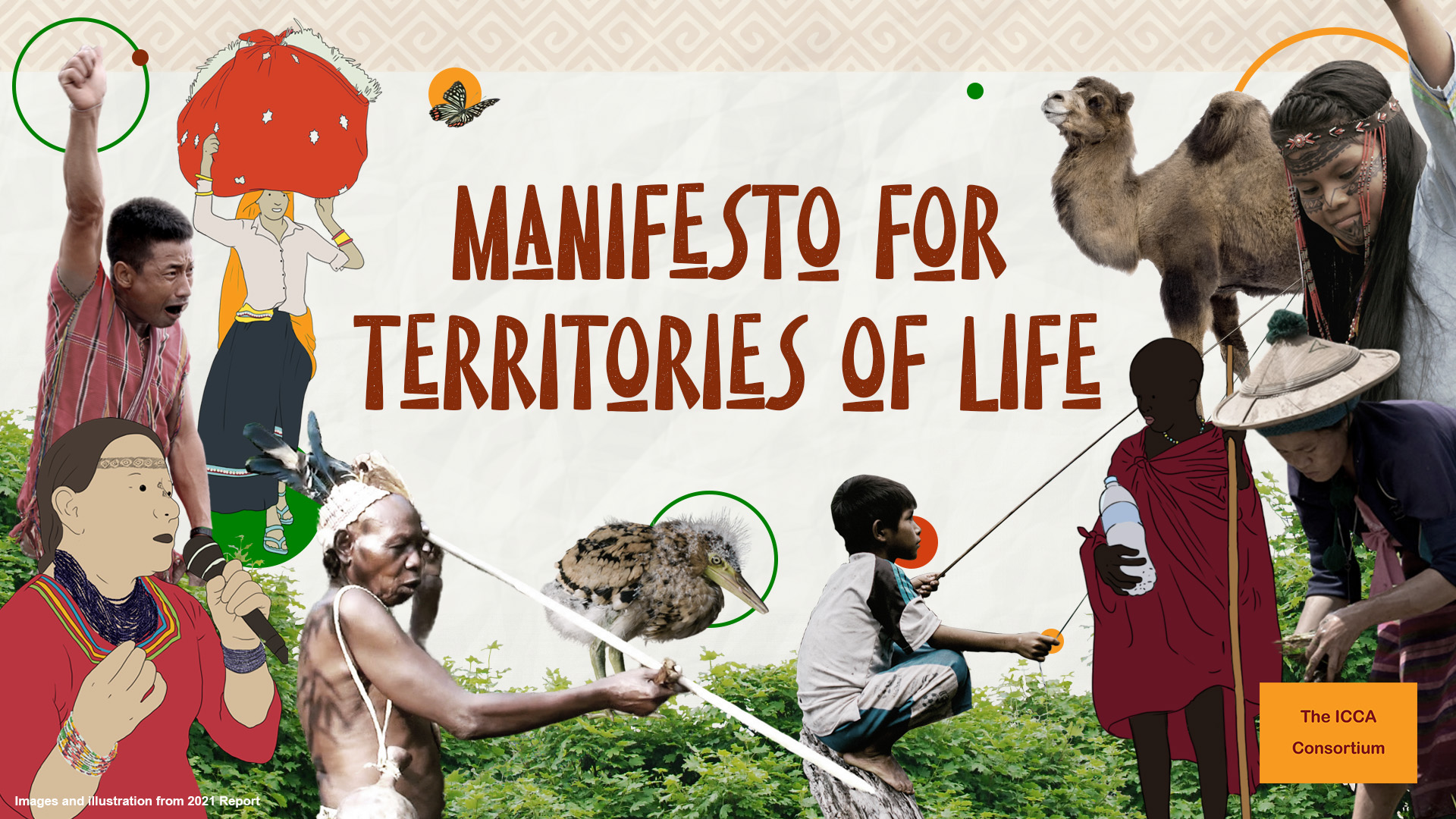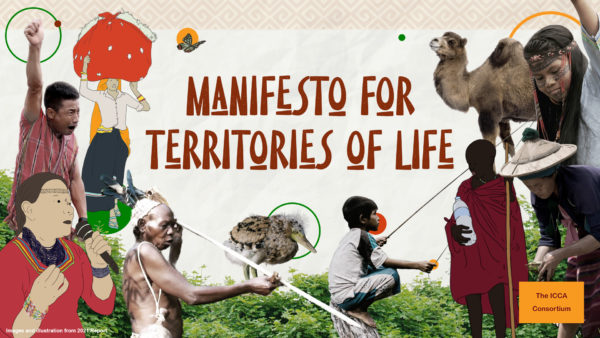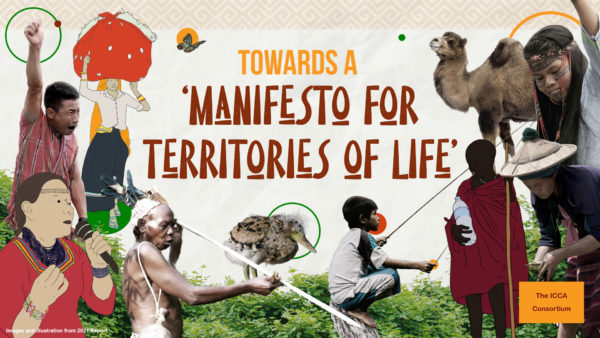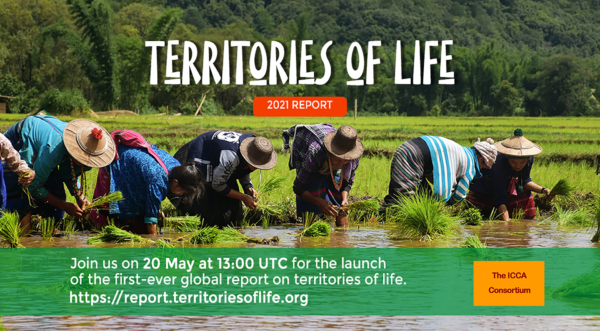Join us as we continue the collective process
First published on 08/22/2023, and last updated on 07/11/2024
Shared by ICCA Consortium
Our ‘Manifesto for territories of life’ is an inspiring statement that concisely articulates the core meaning and reason for being of the ICCA Consortium. The development of the Manifesto was led by the Council of Elders and approved by the nineteenth General Assembly of the ICCA Consortium. The Manifesto is available in English, Spanish, French, Italian, Russian and Chinese, and is currently being translated into other languages.
Download
English (MS Word, PDF)
Spanish (MS Word, PDF)
French (MS Word, PDF)
Italian (MS Word, PDF)
Russian (MS Word, PDF)
Chinese (MS Word, PDF)
The Manifesto is a political statement about the territories of life and the ICCA Consortium, but it also reveals our shared cultural and spiritual values, “what we stand for,” and what we’re asking ourselves and others to do. It is a succinct document comprising four main parts:
- A call for gratefulness and unity based on a solidarity alliance among Indigenous Peoples and community custodians and their supporters.
- An affirmation and pledge to continue to care for the many values of territories of life and the diversity of cultures that nourish them (set on a background of current predicaments and threats and elements of a vision of the desired future).
- An overall aim and commitment to act.
- A set of explanatory notes about the key terms employed in the main text.
As a dynamic and “living” document, the Manifesto for territories of life might be revisited every few years to ensure it remains relevant and timely within changing global contexts while retaining the core of our institutional memory, roots, and values.
Sign the Manifesto
If the Manifesto seems crucially important to you, you may wish to signal that by visibly adding your signature — as a Member, Honorary member, or friend of the ICCA Consortium.
Thank you in advance for your active engagement with this important process.
Signatories (as of April 15, 2024)
Teodoro Brawner Baguilat Jr.
President (Executive Committee), Council, ICCA Consortium
Council of Elders of the ICCA Consortium
Organizations
- Observatorio Ciudadano, Chile (ICCA Consortium Member)
- Indigenous Taiwan Self-Determination Alliance – ITWSDA (ICCA Consortium Member)
- SAVIA, Bolivia (ICCA Consortium Member)
- ALDEA, Ecuador (ICCA Consortium Member)
- Kalpavriksh, India (ICCA Consortium Member)
- U Yich Lu’um, Mexico (ICCA Consortium Member)
- KRAPAVIS, India (ICCA Consortium Member)
- CENESTA, Iran (ICCA Consortium Member)
- APCRM – Kawawana – Mangagoulak Rural Community Fishermen’s Association, Senegal (ICCA Consortium Member)
- Endorois Welfare Council, Kenya (ICCA Consortium Member)
- NCCAF – Nagaland Community Conservation Area Forum, India (ICCA Consortium Member)
- TNRF – Tanzania Natural Resource Forum, Tanzania (ICCA Consortium Member)
- CoopeSoliDar R.L, Costa Rica (ICCA Consortium Member)
- Red Patrimonio Biocultural de México, Mexico, ICCA Consortium Member
- MEMOLab (Biocultural Archaeology Laboratory), Spain (ICCA Consortium Member)
- MBLA – Moroccan Biodiversity and Livelihoods Association, Morocco (ICCA Consortium Member)
- Strong Roots, DRC (ICCA Consortium Member)
- BED – Brod Ecological Society, Croatia (ICCA Consortium Member)
- Natural Justice, South Africa (ICCA Consortium Member)
- Center for Social Development and Sustainability, Nuiwari, A.C., Mexico (ICCA Consortium Member)
- Confederacion Indigena Tayrona, Colombia (ICCA Consortium Member)
- Action pour le Développement Durable ACDD, Cameroon (ICCA Consortium Member)
- Talents des Femmes Autochtones et Rurales, DRC (ICCA Consortium Member)
- ANAPAC, DRC (ICCA Consortium Member)
- Non-Timber Forest Products Exchange Programme NTFP-EP (ICCA Consortium Member)
- Centre Régional de Recherche et d’Education pour un Développement Intégré (CREDI-ONG), Benin (ICCA Consortium Member)
- Asociación Indígena Mapu Lahual de Butahuillimapu, Chile (ICCA Consortium Member)
- Foundation for the Preservation of Wildlife and Cultural Assets, Armenia (ICCA Consortium Member)
- Fundación para el desarrollo de la cultura indígena Los pasos del jaguar, El Salvador (ICCA Consortium Member)
- Congreso indigenas Maje Embera Drua, Panama (ICCA Consortium Member)
- Centro de Estudios Médicos Interculturales CEMI, Colombia (ICCA Consortium Member)
- Centro de Asistencia Legal a Pueblos Indigenas (CALPI), Nicaragua
- ILC Asia Platform on Ecosystem Restoration
- FIDEPE, Cameroon, ICCA Consortium Member
- Aborigine Forum, Russia
- Network of the Indigenous Peoples of Solomon Islands
- UAPASHKUSS : Gardiens des sites sacrés innus, ICCA Consortium Member
Individuals
- Jeff Ganohalidoh Corntassel (Cherokee Nation), Honorary member of the ICCA Consortium
- Sutej Hugu (Siraya People), Honorary member of the ICCA Consortium
- Lorena Arce, Chile, Honorary member of the ICCA Consortium
- Paola Maldonado Tobar, Ecuador, Honorary member of the ICCA Consortium
- Carmen Miranda, Bolivia, Honorary member of the ICCA Consortium
- Delfin Ganapin, The Philippines, Honorary member of the ICCA Consortium
- Joseph Itongwa Mukumo (Walikale People), Democratic Republic of Congo, Honorary member of the ICCA Consortium
- Aman Singh, India, Honorary member of the ICCA Consortium
- Antonino Morabito, Italy, Honorary member of the ICCA Consortium
- Vololoniaina Rasoarimanana, Madagascar, Honorary member of the ICCA Consortium
- Victor Boton, Grabe-Bénin, Benin
- Patricia Mupeta Muyamwa, Zambia, Honorary member of the ICCA Consortium
- Janis Alcorn, USA, Honorary member of the ICCA Consortium
- Alessandra Pellegrini, Australia, Honorary member of the ICCA Consortium
- Christian Chatelain, France, Honorary member of the ICCA Consortium
- Faisal Moola, Canada, Honorary member of the ICCA Consortium
- Emmanuel Sulle, Tanzania, Honorary member of the ICCA Consortium
- Michel Forst, France, Honorary member of the ICCA Consortium
- Mrinalini Rai, India, Honorary member of the ICCA Consortium
- Barbara Ehringhaus, Germany, Honorary member of the ICCA Consortium
- Tim Salomon, The Philippines, Honorary member of the ICCA Consortium
- Rosemary Hill, Australia, Honorary member of the ICCA Consortium
- Shruti Ajit, India, Honorary member of the ICCA Consortium
- Jenny Springer, Honorary member of the ICCA Consortium
- Marco Bassi, Italy, Honorary member of the ICCA Consortium
- Dominique Bikaba, DRC, Honorary member of the ICCA Consortium
- João Gama Amaralare, Portugal, Honorary member of the ICCA Consortium
- Md Kutub Uddin (Mohammad Arju), Bangladesh, Communications Coordinator, ICCA Consortium
- Emmanuel Ole Kileli, Tanzania, Honorary member of the ICCA Consortium
- Ykhanbai Hijaba, Mongolia, Honorary member of the ICCA Consortium
- Jerome Lewis, United Kingdom, Honorary member of the ICCA Consortium
- Marta Villa, Italy, Honorary member of the ICCA Consortium
- Federico Bigaran, Italy, Honorary member of the ICCA Consortium
- Ali Razmkhah, Iran, Honorary member of the ICCA Consortium
- Maria Luisa Acosta, Nicaragua, Honorary member of the ICCA Consortium, and Coordinator, Centro de Asistencia Legal a Pueblos Indigenas (CALPI)
- Carolina Amaya Pedraza, Colombia, Honorary member of the ICCA Consortium
- Niyomugabo Ildephonse, Hope for Community Development Organization (HCDO), Rwanda
- S Faizi, India, Honorary member of the ICCA Consortium
- Jasmin Upton, UNEP-WCMC, Honorary member of the ICCA Consortium
- Vanessa Linforth, UK, Honorary member of the ICCA Consortium
- Kawika Winter, United States, Honorary member of the ICCA Consortium
- Stan Stevens, United States, Honorary member of the ICCA Consortium
- Zakaria Faustin, Tanzania Natural Resource Forum
- Benjamin Ortiz, Red Patrimonio Biocultural de México
- Alessandro Mancuso, Italy, Honorary member of the ICCA Consortium
- Fenosoa Andriamahenina, Madagascar, Honorary member of the ICCA Consortium
- Silvel Elías, Guatemala, Honorary member of the ICCA Consortium
- Cristina Eghenter, Italy, Honorary member of the ICCA Consortium
- Matthew Burke, Leadership for the Ecozoic
- Emma Lee, Australia, Honorary member of the ICCA Consortium
As the Manifesto is a “living document,” comments and suggestions for enrichment are and will always be welcome. As it is also a strategic and urgent document, it is not too soon to reaffirm and energize the alliance among custodians of territories of life and their supporters that the Consortium represents.
The future
The Manifesto is much more than an approved statement that should be kept quiet in the background. Instead, it exists to serve as a stimulus and inspiration for reflection, solidarity, and joint action.
The ‘reflection’ is needed as many of the concepts and ideas included in the Manifesto are rich and offer various interpretations. Drawing from prior work, several membership engagement events in 2022 and 2023 have begun discussing issues like “sustainable self-determination,” “custodianship,” “territories of life,” “resurgence and decolonization,” “self-strengthening,” “self-identification and mutual recognition among peers,” “collective responsibilities and collective rights,” “the commons,” “respect for cultural diversity,” “conserved territories,” “FPIC,” and “social, environmental and climate justice.” The discussions will proceed in the month and years ahead, particularly during online and in-person regional events where the Members and Honorary members more easily share languages and similar contexts.
While the discussions proceed, solidarity alliances and joint action among the Consortium Members and Honorary members will hopefully be inspired at sub-national, national, and regional levels. Such action is urgent. Everyday solidarity exchanges within and among custodians and work to sustain and defend territories of life are happening as we speak. You may have, however, ideas for broader and more demanding initiatives. If so, please get in touch with your regional coordinators and others in the Consortium Council, Secretariat, and membership. If you are already engaged in significant joint action, you are warmly invited to refer to our Manifesto for territories of life in your work and relations with partners and others. As the Consortium evolves in size and structure, it will strive to become ever more supportive of its Members as they take their Manifesto to life.
The context
As a growing and evolving global association supporting Indigenous Peoples and local communities governing and conserving their collective territories of life, the need for developing a Manifesto was felt for a long time across the Consortium.
The decision to develop the Manifesto was taken in January 2019.
Since then, many related discussions took place regionally and globally and, in a more focused way, before, during, and after the General Assembly 2022. Finally, an ad hoc Manifesto Team was established in April 2023 to complete the process. Comprised of members of the Executive Committee, the broader Council, and members of the Council of Elders, this team has facilitated the process of developing the Manifesto and taking it to completion with its approval by the General Assembly on June 28, 2023.
The process
The process of developing the Manifesto was broad and inclusive, especially of Indigenous Peoples and local communities who are custodians of territories of life. The Consortium encouraged and welcomed diverse paths, sources, and input forms, including country or region-specific declarations, Indigenous Peoples’ statements, cultural expressions, personal reflections, and more.
Those aspects were discussed and shared in several places and moments over years, including during national and regional assemblies, the global General Assembly, online group discussions, and the Consortium website and membership discussion list online.
The process dovetailed with other closely related organizational processes, including reflection on our first 10-12 years, developing a new long-term vision, strategic directions, action plans, and possibly new or revised organizational structures and approaches. It was undertaken alongside and in support of the ongoing work of the association and self-strengthening processes of custodians of territories of life. A dedicated exercise in preparation for the Manifesto was diffused among the Consortium membership in the Spring and Summer of 2022, and its results were collected and summarized by the Secretariat.
A final timeline was agreed upon during the membership engagement event on 27 April 2023. The Council of Elders volunteered to prepare the first complete draft of the Manifesto, drawing from inputs (offered in the dedicated exercise 2022 and the outcomes of various national, sub-regional, and regional assemblies) from Members and Honorary members.
The draft was then circulated to the full Council and Secretariat for comments. Their inputs were consolidated, and Teddy Baguilat, President of the ICCA Consortium, shared a few subsequent drafts to the entire Consortium’s membership via the membership forum/email and Loomio. For its part, the Council reviewed the Manifesto on June 22 and agreed for it to be presented for approval to the last session of the Nineteenth General Assembly.
The Manifesto version tabled for approval was available in English, Spanish, French, and Italian. That version— painstakingly crafted by the ad-hoc Manifesto Team spearheaded by our Council of Elders—incorporated plenty of excellent comments and suggestions from our Members and Honorary members, including from dedicated events. The latest membership engagement events occurred online on 6 and 27 June 2023 to discuss the Manifesto’s latest draft(s) and related critical topics. The final discussions occurred during the General Assembly session on 28 June, just before it formally adopted its Manifesto for territories of life.



